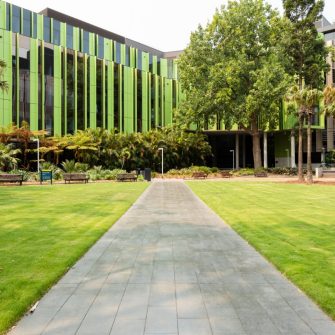Graduate Diploma in Orientation and Mobility
- Commencing Terms
- Term 1
- Duration
- 1 year
- Delivery Mode
- Distance (online with some face-to-face)
- Campus
-
Kensington
- Codes
- Program code 5420
- CRICOS code -
-
Commonwealth Supported Places are available for this program2026 Indicative CSP first year fee
- $9,500*
-
2026 Indicative CSP fee to complete degree
- $9,500*
-
2026 Indicative first year full fee
- $62,500*
-
2026 Indicative full fee to complete degree
- $63,500*
Application closures for 2026
International applications for all undergraduate programs, as well as postgraduate programs offered by the faculties of Arts, Design & Architecture, Engineering (excluding Master of Information Technology and associated programs) and Science are now closed to New Overseas Student Commencement (NOSC) for 2026 intakes.
Postgraduate programs offered by the Business School and the faculties of Law & Justice and Medicine & Health remain open. Master of Information Technology (and associated programs) also remain open.
- Overview
- Entry requirements
- What will I study?
- Future careers
- How to apply
- Fees & Scholarships
Overview
Orientation and Mobility (O&M) is the practice of enabling people with low vision or blindness to know where they are, so they can get where they want to go safely. O&M specialists work with people of all ages, tailoring interventions to suit the needs of the individual client, including people with additional complexities such as health conditions.
Work integrated learning placements form a significant portion of the program and provide opportunities for students to undertake supervised placements at partner organisations such as health facilities, education settings and other relevant agencies. Students are exposed to a wide breath of experience and upon graduating, you will be able to able to demonstrate clinical competence with various populations of individuals with blindness and low vision, allowing you to work across a wide range of organisations that provide O&M services.
Key features
- Hands-on training and industry placements
You will complete a supervised Work Integrated Learning (WIL) placement in an agency providing O&M services. Face-to-face WIL placement components are a critical component of the degree and may be completed in a student’s home state where possible. WIL placements, however, are dependent on the availability in industry, and thus students must be prepared to travel within their state to see clients in different locations and on some occasions may need to undertake a WIL placement interstate.
- Flexible delivery
The theory component of this program is offered through distance online education. There are five weeks of face-to-face techniques training at UNSW in Sydney and approximately 20 weeks of full-time equivalent WIL placement.
- Pathway to accreditation
You will graduate with the specialised knowledge and skills required to work in Australia as an O&M specialist. Accreditation is required by some employers through the US based ACVREP (Academy for Certification of Vision Rehabilitation & Education Professionals). The UNSW Graduate Diploma of Orientation and Mobility meets the core domain requirements for graduates to apply for certification through ACVREP however after graduation you will need to accumulate further supervised practice hours to apply for and sit the Certified Orientation and Mobility Specialist (COMS) exam.
For further information, please visit the program FAQs.
Why study at UNSW?
UNSW's Medicine & Health faculty is ranked #54 globally for life sciences and medicine (QS World University Rankings by Subject, 2025) and is creating the leaders of tomorrow. The Graduate Diploma in Orientation and Mobility will provide graduates with specialised knowledge, and critical and analytical skills to support lifelong learning. It provides practical experience as part of the process for graduates to apply for industry certification and to work as an O&M specialist with clients who have low vision or blindness.
Study with the School of Optometry and Vision Science
UNSW Optometry and Vision Science is the largest school of optometry in Australia. We are committed to forming partnerships within the ophthalmic industry and across the healthcare sector. The School is committed to translational research that will lead to practical applications and significant improvements in community eye health.
Entry requirements
The minimum entry requirement for this program is an AQF level 7 bachelor’s degree in any discipline. Undergraduate degrees from a health science and/or teaching background are generally an advantage.
In order to comply with organisational requirements students will need to have an NDIS Workers Screening Check, which in most states includes a Working With Children Check (WWCC), criminal history check and abide by the immunisation and safety protocols from the relevant health authorities for students in training. Requirements will be outlined specially to students when placements are secured for that student. The cost associated with this work experience will be met by the student.
You will complete a supervised Work Integrated Learning (WIL) placement in an agency providing O&M services. Students must complete the WIL placement in either Australia or Singapore as pre-approved by the UNSW School of Optometry and Vision Science. Students will be required to self-arrange an appropriate visa suitable to complete the face-to-face WIL component in either Australia or Singapore. As the coursework component of this program is delivered through distance online education, international student visas are not available through the program. Admission into this program is a competitive process and there are limited WIL placements available.
English language requirements
You may be asked to provide evidence of your English proficiency to study at UNSW depending on your educational background and citizenship. English language skills are vitally important for coping with lectures, tutorials, assignments and examinations - this is why UNSW requires a minimum English language competency for enrolment.
If you’re completing an Australian Year 12 qualification (e.g. NSW HSC or equivalent), you do not need to provide anything extra to prove your proficiency. Your qualification will be used as evidence of your English proficiency.
If you do need to provide evidence of your English proficiency, this will be indicated in your application. You can prove this by providing evidence that you meet one or more of the following criteria:
- English language tests and university English courses
- Prior study in the medium of English
- Other qualifications
If you need to improve your English skills before you start your degree, UNSW College’s Academic English Programs are for you. The programs are suitable for various English levels and help you prepare for university studies and life in Australia.
For more details, visit the English Language Requirements page.
Expectations of Orientation & Mobility students
Before accepting your offer, ensure you familiarise yourself with the Expectations of O&M students.
For more details, visit our postgraduate resources.
The minimum entry requirement for this program is an AQF level 7 bachelor’s degree in any discipline. Undergraduate degrees from a health science and/or teaching background are generally an advantage.
In order to comply with organisational requirements students will need to have an NDIS Workers Screening Check, which in most states includes a Working With Children Check (WWCC), criminal history check and abide by the immunisation and safety protocols from the relevant health authorities for students in training. Requirements will be outlined specially to students when placements are secured for that student. The cost associated with this work experience will be met by the student.
You will complete a supervised Work Integrated Learning (WIL) placement in an agency providing O&M services. Students must complete the WIL placement in either Australia or Singapore as pre-approved by the UNSW School of Optometry and Vision Science. Students will be required to self-arrange an appropriate visa suitable to complete the face-to-face WIL component in either Australia or Singapore. As the coursework component of this program is delivered through distance online education, international student visas are not available through the program. Admission into this program is a competitive process and there are limited WIL placements available.
English language requirements
You may be asked to provide evidence of your English proficiency to study at UNSW depending on whether you are from an English-speaking background or non-English speaking background. English language skills are vitally important for coping with lectures, tutorials, assignments and examinations - this is why UNSW requires a minimum English language competency for enrolment.
If English is not your first language, you’ll need to provide proof of your English proficiency before you can be given an offer to study at UNSW. You can do this by providing evidence that you meet one or more of the following criteria:
- English language tests and university English courses
- Prior study in the medium of English
- Other qualifications
If you need to improve your English skills before you start your degree, UNSW College’s Academic English Programs are for you. The programs are suitable for various English levels and help you prepare for university studies and life in Australia.
For more details, visit the English Language Requirements page.
Check the specific English language requirements for this program
What will I study?
UNSW is introducing a new academic calendar from 2028.
We are moving to a new flex-semester calendar. What does this mean for your studies?
Program structure
The program delivery mode is full time, largely through distance online education with face-to-face practical components required to be completed as part of the Graduate Diploma.
The practical components include:
- Five weeks of face-to-face techniques training (at UNSW in Sydney) with extra techniques training in home states as required
- Workplace Integrated Learning (WIL) placement (approximately 20 weeks full time equivalent). WIL is a major component of this program, providing opportunities for supervised work integrated learning and external placements in orientation and mobility services at industry partners.
The cost associated with attending practical components (in particular travel, accommodation and meeting away-from-home costs) will be met by the student.
The Graduate Diploma in Orientation and Mobility will equip you with:
1. Advanced disciplinary knowledge in orientation and mobility
Advanced disciplinary knowledge and be able to demonstrate application to practice in the field of orientation and mobility, displaying an awareness of national and international issues in disability, education and broader eye health care sector, and how these issues impact on delivering client services.
2. Demonstrated the required skills to practice as an O&M Specialist
An ability to apply knowledge and skills in orientation and mobility to work across organisations that provide low vision services or as an autonomous practitioner.
3. Demonstrated effective skills in communication and collaboration skills in a digital age
An ability to communicate with clarity, to facilitate understanding, actions and impact to all types of people. Including teamwork, building relationships across contexts, and using digital technology effectively to undertake and improve work outcomes for all.
4. Critical and analytical thinking and application to orientation and mobility intervention
An ability to identify and define the problem, determine viable solutions and make recommendations that have been produced using a range of tools, methods to critically assess existing knowledge, assumptions and elements of the issue in well-reasoned, insightful manner.
5. Creativity and innovation for an evolving industry
Demonstrated being able to connect new ideas, challenge current thinking and practices and create solutions to further evolve the profession.
6. Client focus with an ethical and culturally aware lens and awareness of a wider personal ecosystem that impacts delivering services to clients
An ability to have a proactive client focus, mindful of the client experience, engaging with all stakeholders in an ethical and culturally sensitive way to uphold and monitor actions according to professional responsibilities and the wider world.
7. Initiative, drive and commitment to life-long learning
An ability to demonstrate initiative to further one's knowledge, skills by consistent commitment to self-reflection and monitoring one's practice against newly acquired knowledge.
Please visit the School of Vision Science & Optometry website for more information about this program's delivery and participation requirements.
Future careers
The UNSW Graduate Diploma in Orientation and Mobility is the only program of its kind in Australia. Currently there are a lack of O&M specialists in Australia, particularly in rural areas. There is the opportunity of working in non-for-profit rehabilitation organisations, the private sector, in research and overseas, i.e. Singapore, Africa and the Pacific Islands are in need of O&M specialists.
How to apply
See below for application dates and deadlines for the Graduate Diploma in Orientation & Mobility.
| Key Dates | |
|---|---|
| Applications open | Friday, 1 August 2025 |
| Applications close | Wednesday, 15 October 2025 |
| The acceptance deadline | Monday, 1 December 2025 |
Applications must be submitted through our Apply Online portal. We encourage you to submit your completed application as early as possible to ensure it will be processed in time for your preferred term. Some high-demand programs and Faculties with limited places may have an earlier application deadline or commencement date. Find out more.
Ready to start your application?
For most international students, applications are submitted via our Apply Online service. We encourage you to submit your completed application as early as possible to ensure it will be processed in time for your preferred term.
Some high-demand programs with limited places, may have an earlier application deadline or may have an earlier commencement date. For details, visit the international admissions information page.
Ready to start your application?
Fees & Scholarships
You may be eligible for a Commonwealth Supported Place (CSP) for this degree/program. Domestic students who receive a CSP will have a substantial proportion of their fees subsidised by the Australian government. Start your postgraduate application today with our guide on how to apply.
*The indicative Commonwealth Supported Place (CSP) fees are an estimate based on the relevant student contribution band/s for a Commonwealth Supported Place undertaking a standard full-time load of 48 units of credit per year (1 Equivalent Full Time Student Load/1 EFTSL). To find out more about Commonwealth Supported Places visit Postgraduate Commonwealth Support.
Commonwealth Study Assistance such as Austudy, and Youth Allowance is available for some master’s degrees. For the most up-to-date information and list of degrees visit UNSW Current Student Financial Support.
Note: students will be required to attend techniques training practicals, a low vision clinic observation and work integrated learning (WIL) placements. The cost associated with attending these practical components (in particular travel, accommodation and meeting away-from-home costs) will be met by the student.
*The indicative Commonwealth Supported Place (CSP) fees are an estimate based on the relevant student contribution band/s for a Commonwealth Supported Place undertaking a standard full-time load of 48 units of credit per year (1 Equivalent Full Time Student Load/1 EFTSL). To find out more about Commonwealth Supported Places visit Postgraduate Commonwealth Support.
Indicative fees are a guide only and have been calculated based on the typical enrolment patterns of students undertaking the degree/program. The indicative fee listed here is an estimate for tuition only and excludes non-tuition fees and charges. The amount you pay will vary depending on the calendar year of enrolment, the courses you select and whether your study load is more or less than 1 Equivalent Full Time Student Load (48 units of credit (UOC) per year).
You should not rely on indicative fees as fee increases are assessed when required and may exceed the indicative figures listed here. Actual fees are calculated on enrolment. More information on fees can be found at the UNSW fees website.
Note: Students will be required to complete approximately 350 hours of work experience. The cost associated with this work experience might need to be met by the student, although many industry partners have offered this service in kind.
*Fees are subject to annual review by the University and may increase annually, with the new fees effective from the start of each calendar year. The indicative fees listed here are based on an estimated average and are for tuition only, other fees and charges are not included. The amount you pay will vary depending on the calendar year to enrol, the courses you select and whether your study load is more or less than 1 Equivalent Full Time Student Load (8 courses per year).
Indicative fees are a guide for comparison only based on current conditions and available data. You should not rely on indicative fees. More information on fees can be found at the UNSW fees website.
Indicative fees to complete the program have been calculated based on a percentage increase for every year of the program. Fee increases are assessed annually and may exceed the indicative figures listed here.
Indicative fees to complete the program include tuition plus an estimate of study-related costs of approximately $1,000 per year. To find out more about other costs, visit UNSW International.
Scholarships
At UNSW, we award over $83 million in scholarships each year. We pride ourselves on rewarding excellence and making university accessible to students from all walks of life. Whether you’re a domestic or international student, our range of scholarships, prizes and awards can support your journey.
Progress starts here – at a world-leading university

Top 20 Worldwide
Ranked in the global top 20 for three consecutive years
QS World University Rankings, 2024–2026

Winner of the AFR Most Employable University Award six years in a row
AFR Top100 Future Leaders Awards, 2020–2025

Australia's #1 for Innovation
Highest number of startups and spinouts from university-developed tech
SCOPR report, 2024





